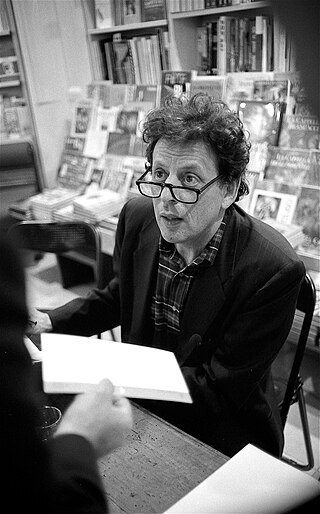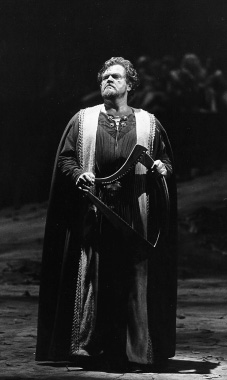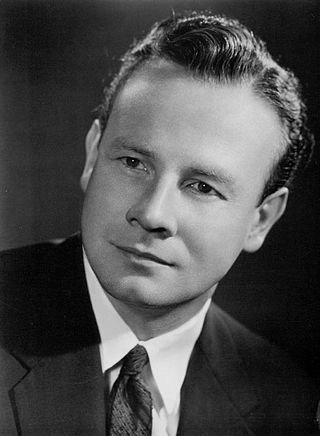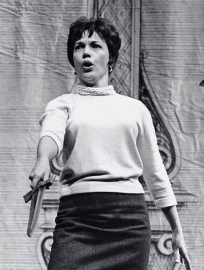Related Research Articles

Satyagraha is a 1979 opera in three acts for orchestra, chorus and soloists, composed by Philip Glass, with a libretto by Glass and Constance DeJong.

Don Quichotte is an opera in five acts by Jules Massenet to a French libretto by Henri Caïn. It was first performed on 19 February 1910 at the Opéra de Monte-Carlo.

Montezuma is an opera in three acts by the American composer Roger Sessions, with an English libretto by Giuseppe Antonio Borgese that incorporates bits of the Aztec language, Nahuatl, as well as Spanish, Latin, and French.
Gianna Rolandi was an American soprano. She was based at the New York City Opera (NYCO) and enjoyed a 20-year national and international career in coloratura soprano roles. She retired from performing in 1994 and served as director of and principal instructor at the Lyric Opera of Chicago's opera studio until 2013.

Richard Cassilly was an American operatic tenor who had a major international opera career between 1954–90. Cassilly "was a mainstay in the heldentenor repertory in opera houses around the world for 30 years", and particularly excelled in Wagnerian roles like Tristan, Siegmund and Tannhäuser, and in dramatic parts that required both stamina and vocal weight, such as Giuseppe Verdi's Otello and Camille Saint-Saëns's Samson.

John Alexander was an American operatic tenor who had a substantial career during the 1950s through the 1980s. He had a longstanding relationship with the Metropolitan Opera in New York City, singing with that company every year between 1961 and 1987 for a total of 379 performances. He also periodically performed at the New York City Opera during his career and was a frequent presence at the Philadelphia Lyric Opera Company during the late 1950s and 1960s. Although he spent most of his career in New York City, Alexander occasionally traveled to perform as a guest artist with many of the world's leading opera houses, both in the United States and Europe. He was also an active concert singer throughout his career.

Beverly Wolff was an American mezzo-soprano who had an active career in concerts and operas from the early 1950s to the early 1980s. She performed a broad repertoire which encompassed operatic and concert works in many languages and from a variety of musical periods. She was a champion of new works, notably premiering compositions by Leonard Bernstein, Gian Carlo Menotti, Douglas Moore, and Ned Rorem among other American composers. She also performed in a number of rarely heard baroque operas by George Frideric Handel with the New York City Opera (NYCO), the Handel Society of New York, and at the Kennedy Center Handel Festivals.
William Stone is an American operatic baritone. He is a graduate of Duke University and University of Illinois at Urbana-Champaign. He made his professional operatic debut in 1975 and his international debut in 1977.
James Maddalena is an American baritone who is chiefly associated with contemporary American opera. He gained international recognition in 1987 when he originated the role of Richard Nixon at the premiere of John Adams's opera Nixon in China at Houston. He has since reprised the role on many occasions, and recorded it for the Nonesuch Records release of the opera in 1987. In addition to Maddelena's role as Nixon, he has originated two other Adams characters: the Captain in The Death of Klinghoffer and Jack Hubbard in Doctor Atomic. He has also performed roles in the premieres of operas by Paul Moravec and Stewart Wallace among other American composers.
William Brown was an American operatic tenor.
John Harger Stewart is an American tenor, conductor, and voice teacher who had an active international singing career in concerts and operas from 1964 to 1990. He began his career singing regularly with the Santa Fe Opera from the mid-1960s through the early 1970s; after which he appeared only periodically in Santa Fe up through the mid-1980s. He was particularly active with the New York City Opera during the 1970s and 1980s, and with the Frankfurt Opera from the mid-1970s through 1990. He also appeared as a guest artist with several other important American opera companies, including the Metropolitan Opera and the Washington National Opera, and at other European opera houses like the De Nederlandse Opera in Amsterdam, the Deutsche Oper Berlin, the Grand Théâtre de Genève in Switzerland, and the Wexford Festival Opera in Ireland. Now retired from singing, he is currently the Director of Vocal Activities at Washington University in St. Louis where he also teaches singing and conducts student opera productions and choirs. He also serves as the opera conductor at the Johanna Meier Opera Theater Institute at Black Hills State University.

Diane Curry is an American operatic mezzo-soprano who is particularly known for her performances of the works of Richard Strauss, Richard Wagner, and Giuseppe Verdi. She was notably the mezzo-soprano soloist on the 1987 recording of Verdi's Requiem by the Atlanta Symphony Orchestra & Chorus and conductor Robert Shaw which won the 1988 Grammy Award for Best Choral Performance.
Elaine Bonazzi was an American operatic mezzo-soprano who had an active international career from the 1950s through the 1990s. A singer with an unusually broad repertoire that encompassed both classical and contemporary works, she notably created roles in the world premieres of operas by composers Dominick Argento, David Carlson, Carlisle Floyd, Gian Carlo Menotti, Thomas Pasatieri, and Ned Rorem. In the United States she was particularly active with the New York City Opera, the Santa Fe Opera, and the Washington National Opera.
Douglas Ahlstedt is an American operatic tenor who had an international performance career with major opera houses from the 1970s through the 1990s. He currently teaches on the voice faculty at Carnegie Mellon University.
Carroll Freeman is an American operatic tenor, opera director, and music educator. He began his career as a prominent boy soprano in the 1960s. From the late 1970s through the mid 1990s he performed widely as a tenor with opera companies and orchestras in the United States. After that he worked as a director of opera productions with opera companies throughout North America. He is the former director of the opera program at the University of Tennessee and currently directs the opera program at Georgia State University. He is also the former Artistic Director of Mississippi Opera, Opera in the Ozarks at Inspiration Point, and opera studios at Knoxville Opera and Des Moines Metro Opera.
Kathryn Day is an American opera singer who has had an active international career spanning five decades. She began her career as a leading soprano under the name Kathryn Bouleyn in the 1970s and 1980s with companies like the New York City Opera, the San Francisco Opera, and the Opera Theater of Saint Louis. With the latter institution she created the role of Cora in the world premiere of Stephen Paulus' The Postman Always Rings Twice (1982).
Andrea Velis was an American operatic tenor who had a lengthy association with the Metropolitan Opera that spanned 33 seasons. Considered a highly skilled character actor, he excelled in supporting roles, often to great comedic effect. His voice is preserved on several recordings made for Live from the Metropolitan Opera and the Metropolitan Opera radio broadcasts.
John Lankston was an American tenor and actor who had a career in opera and musical theater from the 1950s through the 2000s. After making his Broadway debut in Redhead (1959), he went on to create the roles of Adolph and the Ziegfeld Tenor in Jule Styne's Funny Girl (1963) in which he was a featured soloist with Barbra Streisand. For his work, he and the rest of the main cast were awarded the Grammy Award for Best Musical Theater Album at the 7th Annual Grammy Awards. He was a regular performer with the New York City Opera from 1966 to 2001. His greatest success with the NYCO was his creation of the quintuple role of Voltaire/Pangloss/Businessman/Governor/Gambler in the 1982 revival of Leonard Bernstein's Candide which was directed by Hal Prince and filmed for national broadcast on PBS's Live from Lincoln Center. The company later recorded the production on disc, and Langston and the rest of the artists involved were awarded the Grammy Award for Best Opera Recording in 1987.
Joaquin Romaguera is an American tenor and actor. A longtime performer with the New York City Opera from the 1960s through the 1980s, he notably created the role of Professor Risselberg in the world premiere of Gian Carlo Menotti's The Most Important Man in 1971. On Broadway he originated the role of Adolfo Pirelli in the original Broadway production of Stephen Sondheim's Sweeney Todd: The Demon Barber of Fleet Street (1979). He was nominated for the Drama Desk Award for Outstanding Featured Actor in a Musical for his portrayal of Teddy in the 1987 Off-Broadway revival of Cole Porter's Gay Divorce. Other career milestones included portraying Nicolas Orsini in the world premiere of Alberto Ginastera's Bomarzo with the Opera Society of Washington, and appearing as Captain Pirzel in the United States premiere of Bernd Alois Zimmermann's Die Soldaten with conductor Sarah Caldwell and the Opera Company of Boston in 1982.
Thomas Jamerson is an American baritone who had an active international career as an opera and concert performer from the 1960s through the 1990s. He first drew distinction in the field of opera in 1968 when he recorded the role of Baron Douphol in Giuseppe Verdi's La traviata for RCA with conductor Georges Prêtre, the RCA Italiana Orchestra, and Montserrat Caballe as Violetta and Carlo Bergonzi as Alfredo. In 1969 he portrayed roles in the United States premieres of two operas at the Santa Fe Opera: Der Auserwählte in Arnold Schoenberg's Die Jakobsleiter and Captain of the Royal Guard in Hans Werner Henze's The Bassarids. He was a principal artist with the New York City Opera from 1969 to 1984. In 1971 he notably created the role of Professor Bolental in the world premiere of Gian Carlo Menotti's The Most Important Man. He currently teaches voice on the faculty at the Music Conservatory of Westchester in White Plains, New York.
References
- 1 2 3 4 Rockwell, John (October 23, 1981). "New York Times, October 23, 1981". New York Times. Retrieved January 7, 2012.
- ↑ Warren Clark Jr. (August 7, 1957). "New York Times, August 7, 1957". Select.nytimes.com. Retrieved January 7, 2012.
- ↑ Davis, Peter G. (May 19, 1974). "New York Times, 19 March 1974". Select.nytimes.com. Retrieved January 7, 2012.
- ↑ THEODORE STRONGIN Special to The New York Times (March 31, 1967). "New York Times, 31 March 1967". Select.nytimes.com. Retrieved January 7, 2012.
- ↑ ROSS PARMENTER Special to The New York Times (November 11, 1962). "New York Times, 10 November 1962". Select.nytimes.com. Retrieved January 7, 2012.
- ↑ "Lyric Opera of Chicago Archives". Lyricopera.org. Retrieved January 7, 2012.
- ↑ Hughes, Allen (January 20, 1969). "1969 January 20". Select.nytimes.com. Retrieved January 7, 2012.
- ↑ Dunning, Jennifer (January 5, 1981). "5 January 1981". New York Times. Retrieved January 7, 2012.
- ↑ "Lyric Opera of Chicago Archives". Lyricopera.org. Retrieved January 7, 2012.
- ↑ The Broadway League. "James Billings at the Internet Broadway Database". Ibdb.com. Retrieved January 7, 2012.
- ↑ Ericson, Raymond (July 14, 1972). "14 July 1972". Select.nytimes.com. Retrieved January 7, 2012.
- ↑ [ Displaying Abstract ] (August 8, 1972). "New York Times, August 8, 1972". The New York Times. Retrieved January 7, 2012.
- ↑ Schonberg, Harold C. (October 5, 1972). "5 October 1972". Select.nytimes.com. Retrieved January 7, 2012.
- ↑ Donal Henahan. (October 16, 1973). "New York Times, 6 October 1973". Select.nytimes.com. Retrieved January 7, 2012.
- ↑ "New York Times, September 28, 1981". New York Times. September 28, 1981. Retrieved January 7, 2012.
- ↑ Holland, Bernard (September 27, 1983). "New York Times, September 27, 1983". New York Times. Retrieved January 7, 2012.
- ↑ Ericson, Raymond (March 18, 1974). "New York Times, 18 March 1974". Select.nytimes.com. Retrieved January 7, 2012.
- ↑ [ Displaying Abstract ]. "20 September 1975". Select.nytimes.com. Retrieved January 7, 2012.
- ↑ Henahan, Donal (April 16, 1982). "New York Times, April 16, 1982". New York Times. Retrieved January 7, 2012.
- ↑ Henahan, Donal (September 5, 1981). "5 September 1981". New York Times. Retrieved January 7, 2012.
- ↑ New York Times, September 8, 1982
- ↑ Henahan, Donal (October 11, 1980). "New York Times, October 11, 1980". Select.nytimes.com. Retrieved January 7, 2012.
- ↑ Grammy Awards.com Archived February 27, 2009, at the Wayback Machine
- ↑ Bellafante, Ginia. "New York Times, April 7, 1989". The New York Times. Retrieved January 7, 2012.
- ↑ [ Displaying Abstract ]. "New York Times, June 1, 1980". Select.nytimes.com. Retrieved January 7, 2012.
- ↑ Krebs, Albin (January 15, 1982). "New York Times, January 15, 1982". Select.nytimes.com. Retrieved January 7, 2012.
- ↑ Eleanor Blau (December 27, 1982). "New York Times, December 27, 1982". Select.nytimes.com. Retrieved January 7, 2012.
- ↑ DONAL HENAHAN, Special to the New York Times (May 13, 1983). "New York Times, May 13, 1983". New York Times. Retrieved January 7, 2012.
- ↑ "Lyric Opera of Chicago Archives". Lyricopera.org. Retrieved January 7, 2012.
- ↑ "New York Times, February 7, 1996". New York Times. February 7, 1996. Retrieved January 7, 2012.